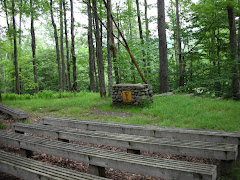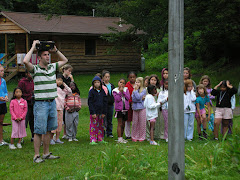Here is the whole article:
Spreading Homework Out So Even Parents Have Some
By TINA KELLEY
MONTCLAIR, N.J., Sept. 28 — The parents of Damion Frye’s ninth-grade students are spending their evenings this fall doing something they thought they had left behind long ago: homework.
So far, Mr. Frye, an English teacher at Montclair High School, has asked the parents to read and comment on a Franz Kafka story, Section 1 of Walt Whitman’s “Song of Myself” and a speech given by Robert F. Kennedy in 1968. Their newest assignment is a poem by Saul Williams, a poet, musician and rapper who lives in Los Angeles. The ninth graders complete their assignments during class; the parents are supposed to write their responses on a blog Mr. Frye started online.
If the parents do not comply, Mr. Frye tells them, their child’s grade may suffer — a threat on which he has made good only once in the three years he has been making such assignments.
 The point, he said, is to keep parents involved in their children’s ’ education well into high school. Studies have shown that parental involvement improves the quality of the education a student receives, but teenagers seldom invite that involvement. So, Mr. Frye said, he decided to help out.
The point, he said, is to keep parents involved in their children’s ’ education well into high school. Studies have shown that parental involvement improves the quality of the education a student receives, but teenagers seldom invite that involvement. So, Mr. Frye said, he decided to help out.“Parents complain about never getting to see their kids’ work,” he said. “Now they have to.”
Some parents, he added, seem happy to revisit their high school years.
“There was one parent last year who would write pages and pages of stuff. It was great, so good to read,” said Mr. Frye, who graduated from Montclair High in 1994.
Others are more resistant. “When my daughter told me about the homework, I looked at her and said, ‘You’ve got to be kidding me. I graduated. I’m done,’” said Lydia Bishop, a local real estate broker whose daughter Vanessa was in Mr. Frye’s class last year. “I did it very resentfully, but I did it.”
Sometimes, Ms. Bishop said, she got out of the homework assignment by logging on to the blog that Mr. Frye created for parents and writing, “I really don’t need this today, I have stuff to do.”
The excuse, she said, was enough to keep Vanessa from being penalized and, despite her reluctance to do homework, Ms. Bishop still thinks Mr. Frye is “one of the best teachers we’ve got.”
Some parents say they like the assignments because they can spark intellectual conversation with teenagers who are normally less than communicative. “Searching for meaning in literary works is like stretching brain-cell-taffy in this household of literal interpretations and men of few words,” one mother wrote on the blog.
Others refrain from complaining to Mr. Frye but figure out the most mature way to say, “The dog ate my homework,” or persuade their spouse to comment on the parent blog instead.
In three years, Mr. Frye said, the assignments have met with only one flat-out refusal. He has received strong support from his bosses — Peter Renwick, an assistant principal at Montclair High, called the approach “very innovative and creative” — and some cautious interest from national teaching experts.
 “I think it’s great,” said Gerald N. Tirozzi, executive director of the National Association of Secondary School Principals. “It’s wonderful to involve parents in this way, very meaningfully, and directly related to the instruction the children are receiving in school.” Mr. Tirozzi said he had not heard of any other teachers making similar assignments, and added that he would be interested to know if the students were performing better.
“I think it’s great,” said Gerald N. Tirozzi, executive director of the National Association of Secondary School Principals. “It’s wonderful to involve parents in this way, very meaningfully, and directly related to the instruction the children are receiving in school.” Mr. Tirozzi said he had not heard of any other teachers making similar assignments, and added that he would be interested to know if the students were performing better.Carol Jago, the incoming vice president of the National Council of Teachers of English, said, “This is one of those really good ideas that has the potential to do what we really want in society.
“It has to do with what we talk to our students about, and what kind of models we are for our children as readers,” she said, adding that in her 32 years of teaching, she has often asked parents to forgo hiring tutors and instead just read the books their children were reading.
“With 10th graders, the parents often really did tell me that it was the one place where they could talk with their student without fighting, without arguing about their hair,” Ms. Jago said.
But she also cautioned against penalizing students for something that their parents cannot or refuse to do.
“Common educational wisdom is that you don’t assign homework that kids can’t do on their own,” she said.
In fact, Mr. Frye has not penalized students whose parents have told him outright that they will not post responses. But in one case, when the parents neither did the homework nor explained why, a student did lose points — but not enough to lower the student’s overall grade, he said.
He said he got the idea for the homework assignments from a district kindergarten teacher he sat next to during teacher orientation one year, who asked parents to write about what their children had done over the weekend.
Experts say that while many elementary school teachers ask parents to write letters introducing their children at the beginning of the school year, few teachers subject parents to a weekly regimen of reading and writing.
Mr. Frye, 30, teaches 65 ninth graders, in three sections, in a classroom where student art and album covers from Stevie Wonder and John Coltrane decorate the walls. As part of the school district’s efforts to reduce the achievement gap between black and white students in this Essex County suburb — a topic Mr. Frye studied for his graduate thesis — every freshman, regardless of earlier performance in school, takes a world literature course, considered a high honors class, like his.
He said that all the students’ parents had computer access and that only two had told him that they were not fluent in English; one posts on the blog anyway, one sends her responses to him privately, by e-mail. Another parent phones responses in to him.
Tony Lopez, a corporate lawyer who posted a lengthy reaction to the Kennedy speech, given the day after the Rev. Dr. Martin Luther King Jr. was shot, said he was actually glad to do the weekly homework
“I take it as giving back to the teacher what he is apparently giving to our kids, a lot of attention and a lot of requirements,” Mr. Lopez said. He added that he had been impressed with Mr. Frye’s preparations for the class.
“As a family, we opted to meet him at least halfway,” he said.
Tracy Parsons, whose son Danny is the second of her two boys to be a student in Mr. Frye’s class, said that the weekly assignments had changed the way she approached homework with her children.
“In high school, to some degree you have to back off from homework, so they can gain independent learning skills,” Ms. Parsons said. But teenagers, she noted, “leave a lot out. You ask, ‘What’d you do in science?’ and they say, ‘It was fine.’”











